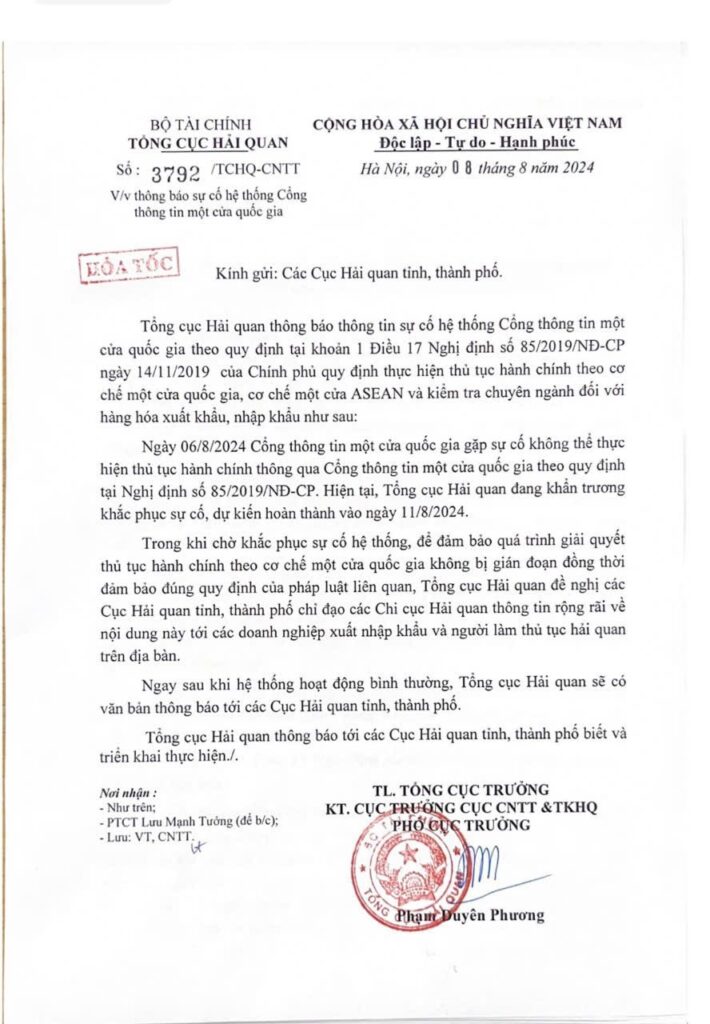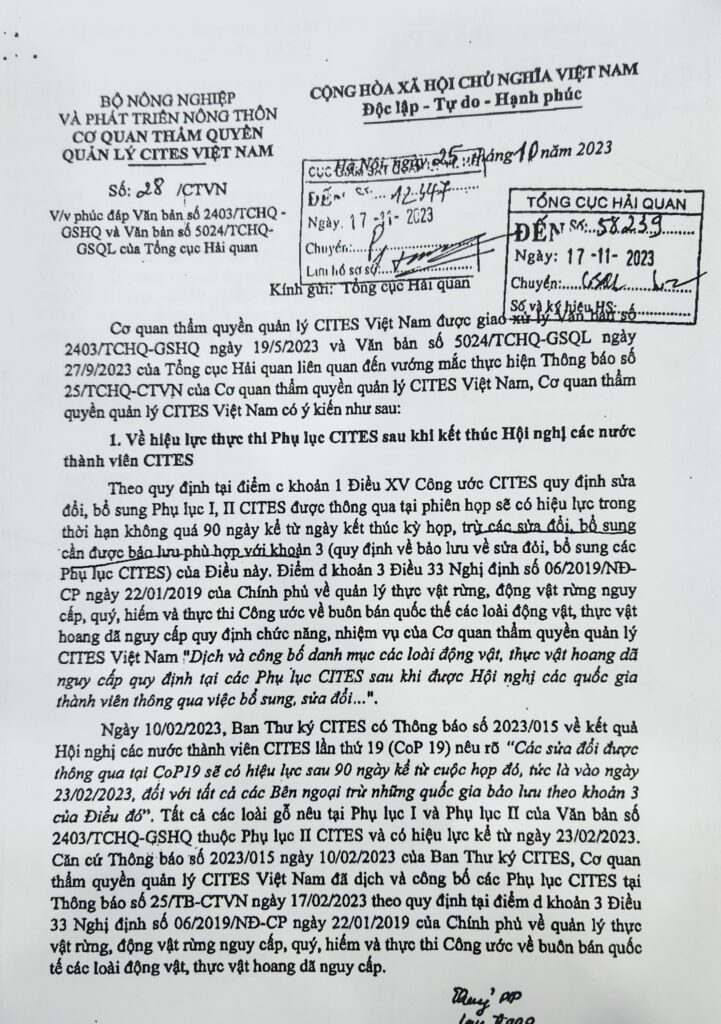Procedures for recognition of priority enterprises in the field of customs
- April 24, 2023
| Procedure name | Procedures for recognition of priority enterprises in the field of customs |
| Decision issued | Decision No. 350/QD-BTC dated March 8, 2019 |
| How to perform | Enterprises send paper documents to the General Department of Customs |
| Resolution deadline | The General Department of Customs conducts appraisal and concludes the recognition of priority enterprises within 30 (thirty) days from the date of receipt of complete documents according to regulations; For complicated cases where opinions from relevant Ministries and branches need to be sought, the appraisal time may be extended but not exceeding 30 (thirty) days; In case it is concluded that the enterprise meets the conditions for applying the priority regime, within 10 (ten) working days, the Director General of the General Department of Customs will sign a Decision recognizing the priority enterprise. |
| Implementation object | Enterprises export and import goods. – Customs clearance agent. – Organizations and individuals importing goods to implement key investment projects that are consulted by the Prime Minister before granting investment licenses that are in the basic construction stage. |
| Implementing agencies | – Authority with decision-making authority: General Department of Customs
– Competent agency or person authorized or decentralized to perform (if any): Department of Post-customs Clearance Inspection (stipulated in Decision No. 2659/QD-TCHQ dated September 14, 2015 of the Director General of the General Department of Customs). Customs Department) – Agency directly implementing administrative procedures: Post-clearance Inspection Department – General Department of Customs. – Coordinating agency: Tax Department of the province or city where the enterprise is headquartered. |
| Result | Decision to recognize priority enterprises (Form 03/DNUT issued together with Circular 07/2019/TT-BTC dated January 28, 2019). |
| Fees and charges | Not available. |
| Requires implementation conditions | 10.1. Conditions for compliance with customs and tax laws Within 02 (two) consecutive years, most recent to the time the enterprise submits a written request for recognition as a priority enterprise, the enterprise has not committed any violations. regulations of the law on taxes and customs to the extent of being handled for violations of the following acts: - Acts of tax evasion and tax fraud; smuggling and illegal transportation of goods across borders; – Administrative violations in the field of customs have forms and penalties that exceed the authority of the Director of the Customs Branch and equivalent positions; – For Customs clearance agents, the number of Customs declarations in the name of the clearance agent handled for administrative violations in the Customs and Tax fields falls under the handling authority of the Branch Head. Customs and equivalent titles do not exceed the rate of 0.5% calculated on the total number of declarations that have gone through Customs procedures. – No overdue tax debt according to regulations. 10.2. Conditions on export and import turnover a) Enterprises achieving import-export turnover of 100 million USD/year or more. b) Enterprises achieving export turnover of goods made in Vietnam of 40 million USD/year or more. c) Enterprises achieving export turnover of agricultural and aquatic products produced or raised or grown in Vietnam of 30 million USD/year or more. d) Customs clearance agents: the number of customs declarations that have gone through customs procedures under the agent's name during the year reaches 20,000 declarations/year or more. The export and import turnover specified in points a, b, c, d above is the average turnover of 02 (two) consecutive years, most recent up to the date the enterprise has a written request for consideration, not including entrusted export and import turnover. d) Do not apply export and import turnover conditions to enterprises certified by the Ministry of Science and Technology as high-tech enterprises according to the provisions of the High Technology Law. 10.3. Conditions for electronic customs procedures and electronic tax procedures Implementing electronic customs procedures and electronic tax procedures; Have an information technology program to manage export and import activities of enterprises to ensure inspection requirements of customs authorities. 10.4. Conditions for payment for exported and imported goods Make payments for exported and imported goods through banks according to the regulations of the State Bank. Enterprises are responsible for notifying the customs authority of their account numbers and list of transaction banks. 10.5. Conditions for internal control system An enterprise meets the conditions for an internal control system if the enterprise meets the following conditions: - The enterprise implements and maintains management, supervision and control processes practically operate all activities of the enterprise; – Enterprises have internal control measures, means and processes to ensure security and safety of the supply chain of exported and imported goods as follows: + Monitor the process of transporting goods from the enterprise to ports and from ports to businesses; + Check container safety before loading onto means of transport; + Monitoring at important locations: Fence areas, entrance gates, warehouses, production areas, administrative areas; + Decentralize employees to move and work in areas appropriate to their tasks; + Security control of information technology systems; + Personnel security. 10.6. Conditions for good compliance with laws on accounting and auditing - Applying accounting standards according to regulations of the Ministry of Finance; – Annual financial statements must be audited by an auditing company qualified to provide audit services according to the provisions of law on independent auditing. The audit opinion on the financial statements stated in the audit report must be a fully accepted opinion according to Vietnamese auditing standards. 10.7. In case an enterprise is suspended from applying the priority regime, for the next 2 years, the enterprise will not be considered or recognized as a priority enterprise by the General Department of Customs. |
| Legal grounds | Article 42 to Article 45, Clause 1, Article 101 of the Customs Law dated June 23, 2014;
– Clause 2, Article 9 of the Law on Export Tax and Import Tax dated April 6, 2016; – Article 9 to Article 12 of Decree No. 08/2015/ND-CP dated January 21, 2015 of the Government detailing and implementing measures of the Customs Law on customs procedures, inspection, supervision and inspection customs control; – Clause 7, Article 1 of Decree No. 59/2018/ND-CP dated April 20, 2018 of the Government amending and supplementing a number of articles of Decree No. 08/2015/ND-CP dated January 21, 2015 of The Government regulates details and measures to implement the Customs Law on customs procedures, inspection, supervision and control; – Circular No. 72/2015/TT-BTC dated May 12, 2015 of the Minister of Finance regulating the application of priority regime in implementing customs procedures, customs inspection and supervision for goods export and import goods of enterprises; – Circular No. 07/2019/TT-BTC dated January 28, 2019 of the Minister of Finance amending and supplementing a number of articles of Circular No. 72/2015/TT-BTC dated May 12, 2015 of the Ministry The Minister of Finance regulates the application of priority regimes in implementing customs procedures, customs inspection and supervision for export and import goods of enterprises. |
| The order of execution | 1.1. BWish 1: Enterprises send paper dossiers to the General Department of Customs to be considered for application of priority regime (changing the dossier receiving unit, specifically: changing the receiving unit from the provincial, inter-provincial and city Customs Departments). centrally-run city to the General Department of Customs)
1.2. BWish 2: The General Department of Customs evaluates the conditions for applying the priority regime – Document appraisal: The General Department of Customs checks the completeness, legality and validity of the enterprise's documents; Compare the information provided by the enterprise and information collected about the enterprise from the tax authority and customs authority where the enterprise is headquartered and where the enterprise has export and import activities with the conditions that apply priority; In case the dossier is incomplete, within 05 (five) working days, the General Department of Customs will issue a written notice for the enterprise to submit additional documents; In case the dossier does not meet the conditions for applying the priority regime, the General Department of Customs will respond in writing to the enterprise, clearly stating the reason for non-compliance; In case the results of checking enterprise records meet the conditions for applying the priority regime, the General Department of Customs will conduct an actual appraisal at the enterprise; – Actual appraisal: The General Department of Customs organizes physical appraisal at enterprises. The actual appraisal content includes: + Compare the actual inspection results with the information declared by the enterprise; + Post-customs clearance inspection at the customs declarant's headquarters to assess compliance with the law if within 24 (twenty-four) consecutive months, most recent to the time the enterprise submits a written request for recognition Priority enterprises, enterprises that have not been inspected or post-clearance audited to assess compliance with customs laws and tax laws. 1.3. BWish 3: The General Department of Customs decides to recognize priority enterprises. |
| Profile components | 3.1. For businessExport and import of goods, Dreason lahm thCustoms clearance, Profile include:
– Written request according to form 02a/DNUT issued with Circular 07/2019/TT-BTC dated January 28, 2019: 01 original copy; – Audited financial statements for the last 02 (two) consecutive financial years: 01 photocopy; – Audit reports for 02 (two) most recent consecutive financial years: 01 photocopy; – Inspection conclusions for the most recent 02 (two) years (if any): 01 photocopy; – A description of the enterprise's internal control system that fully describes the actual management, supervision, and operational control processes in the entire supply chain of export and import goods of the enterprise : 01 original copy; – Certificates of commendation and quality certificates (if any): 01 photocopy. Number of documents: 01 set 3.2. For tOrganizations and individuals import goods to thImplement key investment projectsm approved by the Prime Minister kiUntil the investment license is granted, it is in the basic construction stage, Profile include: – Document requesting application of priority regime and commitment to implement the project on schedule according to form 02b/DNUT issued with Circular No. 72/2015/TT-BTC dated May 12, 2015: 01 original copy ; – Investment certificate, economic and technical explanation: 01 photocopy. |
| Number of records | 01 set |
| Name of the declaration form | – Enterprises exporting and importing goods and customs clearance agents submit a written request for application of priority regime according to form 02a/DNUT issued with Circular 07/2019/TT-BTC dated January 28/2019. January 2019 – Organizations and individuals importing goods to implement key investment projects that are consulted by the Prime Minister before granting investment licenses and are in the basic construction stage submit a written request for application. Apply the priority regime according to form 02b/DNUT issued with Circular 72/2015/TT-BTC dated May 12, 2015. |
| Attachments | 07_2019_TT-BTC_406433.doc |
SEN TRONG LOGISTICS LOGISTICS CO., LTD
Phone: (+84) 28-2218.7777 // (+84) 28-2219.7777
Website: https://whitelotuslogistics.com.vn
Email: sales777.whitelotus@whitelotuslogistics.com.vn
Contact: Ms. Tran Thi Thuy Trang – CEO
Hotline: (+84) 903.712.368
Related Posts
Urgent CV to notify the National Single Window Portal system incident.
VAT is further reduced by 2% until the end of this year
ABOUT TAX POLICY ...... ACCORDING TO OFFICIAL DISpatch 706/TCHQ-TXNK DATED FEBRUARY 22, 2024
NO. 01/2024/TT-BNNPTNN, February 2, 2024
Official dispatch amending CITES
Method of calculating export tax and import tax 2024
Subjects subject to export tax and import tax 2024
Procedures for pre-determination of customs value 2024
Allocation of 2024 adjustments
Adjustments except 2024
Adjustments plus 2024
Special relationship
Whatever you need, we're here to help
Logistics solution
We meet the needs of customers of the supply chain.
Contact us
Our team of dedicated professionals is here for you.
Request a quote
Request an inland tariff quote from us.



